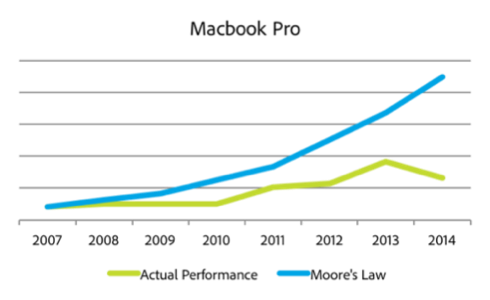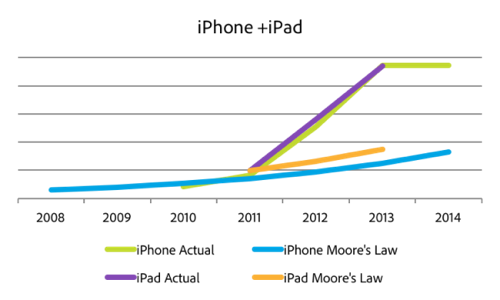Moore’s Law is dead at the age of 50. Everyone says so.
And yet, if we look at improvements in mobile performance over the past few years, if anything, we see Moore’s Law in overdrive. What gives?
Moore’s Law Is Too Expensive
Moore’s argument, which has stayed strong for 50 years, is essentially that by shrinking transistors on a chip every 18 months or so, engineers could roughly double performance in that time period. More recently, however, the economics of shrinking transistors has become cost-prohibitive.
While Moore’s Law probably has another decade to run, the cost of keeping up is already causing some to lose faith in it.
The Wall Street Journal’s Don Clark declares Moore’s Law is “hitting some painful limits,” given the exploding costs of shrinking transistors.
The Economist, for its part, highlights the shift away from raw processing power to cloud computing:
[T]ransistors can be shrunk further, but they are now getting more expensive. And with the rise of cloud computing, the emphasis on the speed of the processor in desktop and laptop computers is no longer so relevant. The main unit of analysis is no longer the processor, but the rack of servers or even the data centre. The question is not how many transistors can be squeezed onto a chip, but how many can be fitted economically into a warehouse. Moore’s law will come to an end; but it may first make itself irrelevant.
But before we bury Moore’s Law, it’s worth exploring its current impact on mobile.
Mobile: Moore’s Law In Overdrive
If we think of Moore’s Law in terms of raw performance, and not necessarily a matter of shrinking transistors, then mobile computing clearly shows Moore’s Law in overdrive.
For example, if we look at how MacBook Pro performance compares to what Moore’s Law would anticipate (using Geekbench data), it’s clear that Moore’s Law isn’t driving laptop performance:

Now compare this to the meteoric performance increases for Apple’s mobile iOS devices:

In the PC market, market growth and investment has slowed considerably, with the cloud taking on more and more of the burden of delivering processing power. In mobile, by contrast, the market is booming and the need for more on-device processing power is sprinting to keep pace with software (and cloud) innovation.
Again, I’m not really talking about the number of transistors scrunched onto a single chip, which is at the heart of Moore’s Law, but rather an extrapolation thereof: mobile chip performance is off the charts, even as it stagnates in PCs.
Room To Roam
This isn’t new, but it’s being overlooked in the premature eulogies for Moore’s Law. As Intel’s Matt Ployhar wrote back in 2010, the mobile industry is moving at “Moore’s Law pace or faster.”
And then there’s Raj Sabhlok’s contention that even if Moore’s Law is petering out for hardware, something similar is happening in software: “The price of software applications has plummeted, while the functionality and quality has grown exponentially.”
Either way, expect the pace of computing—and innovation—to accelerate for years within mobile. Call it the revenge of Moore’s Law, or whatever you want. But it’s fast, and getting faster.
Photo by Pawel Loj; charts by ReadWrite









